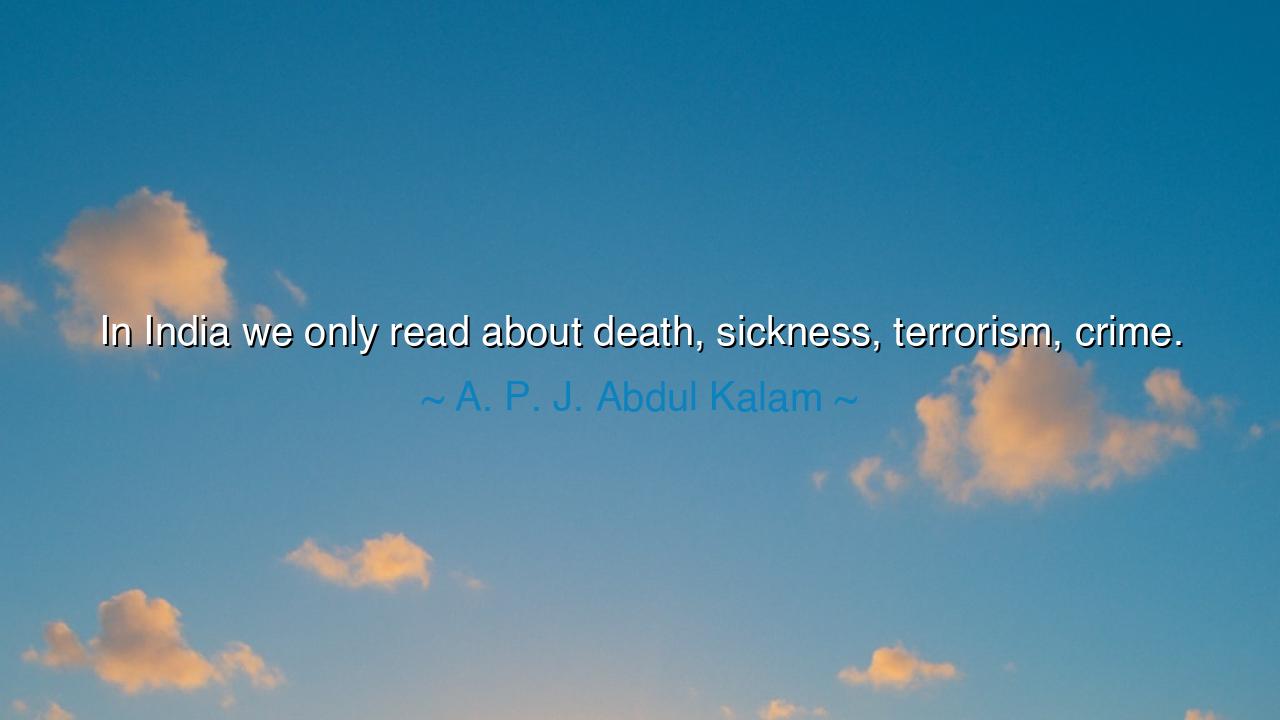
In India we only read about death, sickness, terrorism, crime.






“In India we only read about death, sickness, terrorism, crime.” Thus spoke A. P. J. Abdul Kalam, the humble scientist who became the People’s President, a man whose vision burned with the light of a thousand suns. In these few words, he lamented not the darkness of India itself, but the darkness of perception — the narrow gaze of a society that sees only its wounds and not its strength. His statement was not one of despair, but of awakening. For he believed that the soul of a nation is shaped not merely by what it endures, but by what it chooses to celebrate.
Dr. Kalam uttered these words in a time when the media had grown obsessed with negativity, when each headline screamed of death, corruption, and fear. He saw a great nation, ancient and wise, forgetting to see its own greatness — forgetting that in its villages, its schools, its laboratories, its people, there was hope, creativity, and progress. He called upon Indians to look beyond the sorrow and chaos that filled their newspapers and televisions, and to rediscover the quiet triumphs that pulsed beneath the noise. For he knew that what a people read, think, and speak of, they become. A mind constantly fed on fear will shrink; a nation constantly told it is broken will forget that it can rise.
This was the heart of Kalam’s teaching — that attitude shapes destiny. When a man looks only at the shadows, he forgets the sun. Likewise, when a civilization focuses only on its failures, it blinds itself to its immense potential. India, he said, had achieved marvels: it had launched satellites into the heavens while millions still prayed by candlelight; it had produced minds that shaped global technology, medicine, and art. Yet these stories rarely made their way into the public heart, drowned out by the drumbeat of despair. Kalam sought to awaken the sleeping spirit of optimism, to remind his people that progress cannot bloom in soil watered only by cynicism.
Consider the life of Kalam himself — born in a small coastal town, selling newspapers as a boy, yet rising to become one of the chief architects of India’s space and missile programs. He could have surrendered to hardship, but instead he saw possibility where others saw limitation. When a rocket exploded in the early days of India’s space program, he did not dwell on failure. He said simply, “We will succeed next time.” And they did. It was this spirit — the refusal to define life by its defeats — that he wished his nation to embrace. His words were not a condemnation of India, but a plea for it to believe in itself once more.
Throughout history, nations have risen or fallen not by strength of arms, but by strength of spirit. After the ashes of the Second World War, Japan rebuilt itself not through despair, but through an unyielding faith in innovation and discipline. When Martin Luther King Jr. stood amidst the wounds of segregation, he did not speak of hate, but of a dream — a vision so luminous that it reshaped a continent’s conscience. In the same way, Kalam’s call to India was a call to dream — to see beyond the headlines, to look into the eyes of its children, its teachers, its scientists, and see the flickering flame of a new dawn.
“In India we only read about death, sickness, terrorism, crime.” These words, when understood deeply, are not a complaint against journalism alone — they are a mirror to every individual who feeds upon despair. For in every life, there exists both darkness and light. To focus only on the suffering is to kill the spirit; to focus only on the hope is to ignore the truth. But to acknowledge the pain while choosing to nurture the light — that is wisdom. Kalam urged his people to become creators of hope, not consumers of fear. He wanted each citizen to become a reporter of goodness, a messenger of inspiration, to fill the nation’s heart with stories that uplift rather than weaken.
So, my child, let this be the lesson you carry forward: guard your mind from the poison of despair. Seek truth, but also seek balance. When you speak, let your words sow courage, not fear. When you read, do not feed only upon the tragedies of the world — feed also upon its wonders. Tell the stories of those who heal, build, teach, and create. For as Kalam taught, a nation is built first in the minds of its people. If your thoughts are noble, your country will be noble; if your spirit is strong, your world will be strong.
And thus, live as he lived — with faith in the future, with the courage to see the light even when surrounded by darkness. For the destiny of a people, and indeed of humanity itself, lies not in the headlines of despair, but in the quiet resolve of hearts that still believe.






AAdministratorAdministrator
Welcome, honored guests. Please leave a comment, we will respond soon